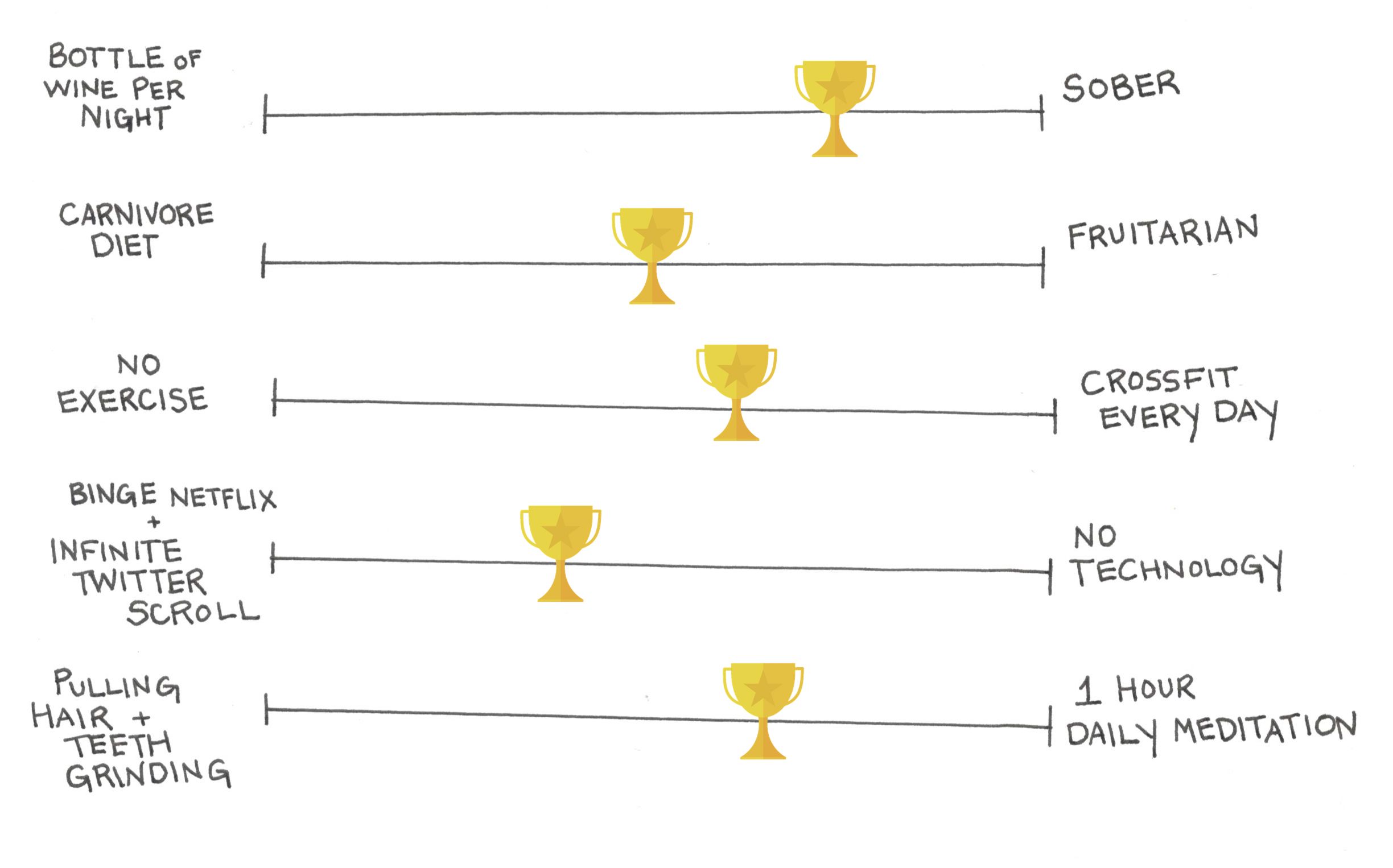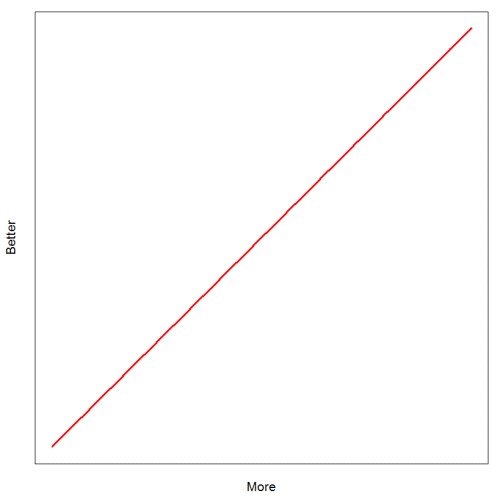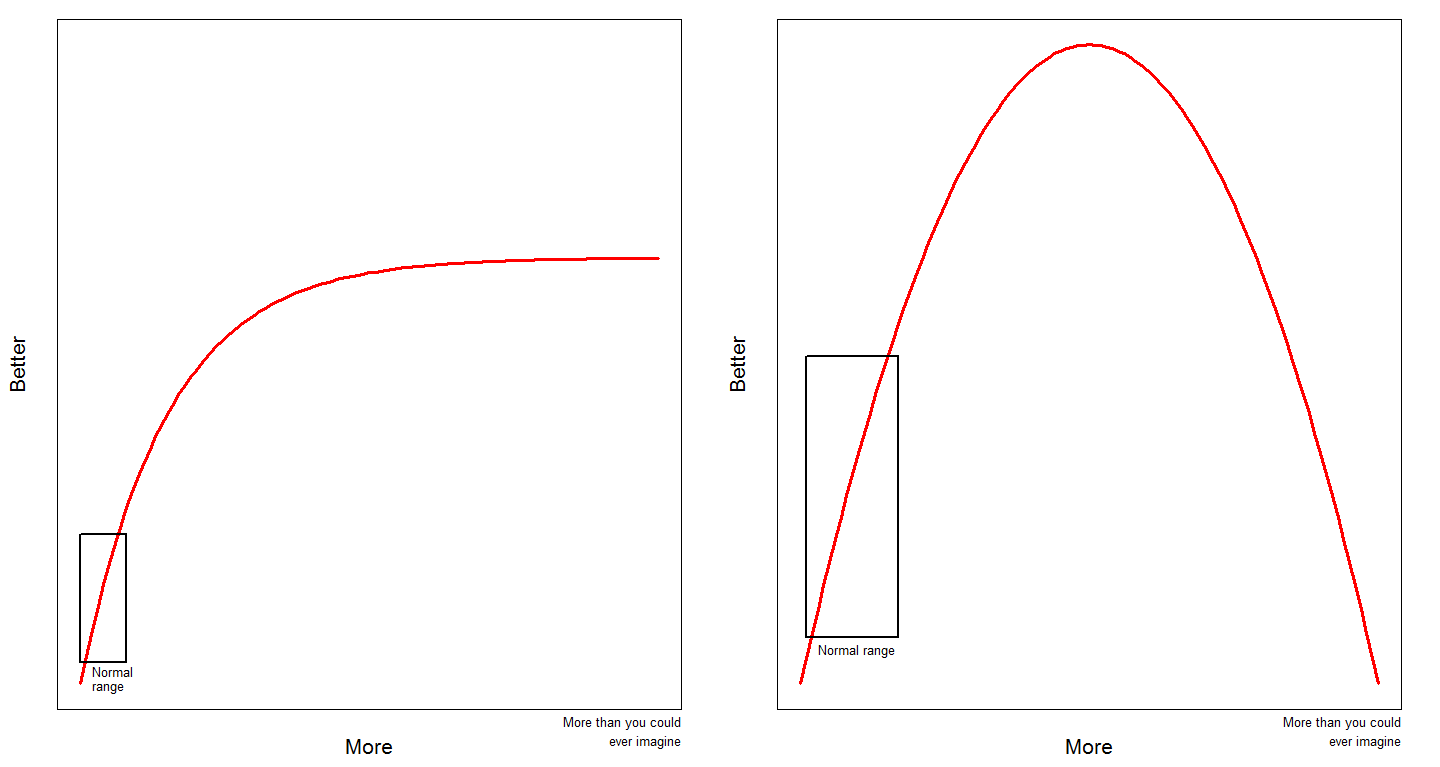It's well-trod advice: To eat, work, or play moderately is the healthiest way to live.
In fact, humans have been contemplating this concept for much of history. One of the phrases carved into the Ancient Greek temple of Apollo at Delphi was meden agan, or: "nothing in excess.” Aristotle believed that every virtue falls in the middle of two extremes—excess and deficiency, something he called "the doctrine of the mean." Confucian texts refer to zhongyong— zhong translating to "bent neither one way or another," and yong to "unchanging": Consistent moderation.
So why is it that after centuries of championing this approach, we abandon moderation every New Year’s Eve, flinging ourselves toward extreme resolutions? We seek to eradicate habits altogether, or to start intensely doing something new. I'm no longer going to eat added sugar. I'm going to go to CrossFit every day. I'm not going to use my phone before bed ever again.
This is probably one reason why about 80 percent of people give up on their resolutions by February. "I strongly believe this is the case, because people go from 0 to 200 miles per hour in setting their goals," said Marco Palma, the director of a human behavior laboratory at Texas A&M University.
How might Aristotle make a New Year's resolution? This year, try a moderation challenge. This would involve identifying the things in your life you want to change, and instead of quitting them entirely, intentionally continue to do them—but at a lower frequency.

A moderation challenge would seek to make a resolution that falls somewhere in the middle of the two extreme ends of the spectrum for a certain behavior. Easy right? Actually, no. What makes moderation such difficult advice to follow is that it's vague. What is the mean between no exercise and The Rock's workout regimen (and the excess of cod he consumes)?
Studies have found that people tend to define moderation in ways that justify their current behavior. If one person has dessert once a month, and another eats it every other day, they might both define moderation as their individual intake of sweets—even if those amounts are very different.
I went in search of more precision.
What exactly does moderation consist of?
Peter Gollwitzer, a professor of psychology at NYU, studies how people translate goals into action. He said that people often confuse goals with plans. Making a goal gives the illusion of taking action, but it's a plan that allows us to achieve our goals—not the goals themselves.
"For instance, people have the goal to save a certain amount of money every month, each month," he said. "Then they say, 'Now I have a plan.' Nope, they don't have a plan. They only have a goal.”
A plan needs to be specific. How will you accomplish saving that amount of money? When and where will it happen? Gollwitzer said if/then statements can help. Like: If I go out to eat, then I will not buy a drink or appetizer. Or: If I get my paycheck, then I will put $200 into my saving account.
Ultimately, moderation is just a feature of a goal, not a plan. “You have the same old problem again," Gollwitzer said. "You have a goal, which is to be more moderate, but you don't have a plan on how to implement that action.”
Moderation, by definition, decrees that there will be moments when you don’t stick to your resolution. So plan it out. It may feel counterintuitive to plan to eat junk food if your goal is to stop eating junk food. Or, to splurge if you’re trying to save money. But as long as it's intentional, it may help your resolution in the long run.
You’ll have more self control if you plan your screw ups
A study from 2016 found that it's not harmful to have what researchers called “planned hedonic deviations," or scheduled pleasurable detours from your resolutions. They found that continued abstinence and inhibition from a habit could lead to “irresistible urges” and cravings, so “it may be good in the long run to behave 'badly' on occasion, when it is planned."
It is critical that these deviations are planned in advance, so that going against a resolution doesn’t make you feel like you messed up. (That could trigger a what-the-hell effect—when you think, "Oh, what the hell," and double down on whatever you’re indulging in. It’s also referred to as a “failure cascade.”)
In the study, hedonic deviations accounted for 15 percent of the subjects’ overall activity. Let’s say you want to refrain from drinking during the work week, as you’ve been finding yourself coming home each day and pouring a glass of wine that turns into two or three. 15 percent of 5 weekdays is .75, which we can round up to 1. Perhaps when you first make your resolution, you plan that if it's a Wednesday, then you’ll take a break and deviate from your resolution and have one drink.
Once you decide how frequently you’re going to have a planned hedonic deviation, you can create other if/then statements that suit your lifestyle or needs:
If it's a Friday night, then I will have 2 drinks with my friends.
If it’s date night with my partner, then I will have a dessert with them.
If it’s Sunday morning and I'm tired, then I will skip the gym, sleep in, and read the paper in bed.
The study found that the deviations in advance didn’t derail people from achieving what they wanted.
This kind of intentional moderation better lines up with how our self control works too, Palma said. In the past, some thought self-control was a resource that could get used up, like a battery losing charge, while others theorized that if you practiced self-control, you could get better at it, and exerting it was a positive thing.
In 2018, Palma did a study to see which of these theories were more accurate, and found them both to be somewhat true. Testing people in a self-control task, he found that it was possible for them to burn out and deplete their self-control resources. But when people took a self-control break before they reached that threshold, they were able to improve their overall levels of self-control, and have more self-control later.
Palma said it revealed that self-control is like a muscle. If it's worked out safely, and in moderation, it can get stronger. If it's over-exerted, it can be injured or too sore, and be out of commission.
“If we overdo it by setting too-high goals that are too extreme, then we rapidly get to a region in which we're starting to look at this fatigue effect of self-control resources, and they start to deplete,” Palma said.
Achievement begets motivation, not the other way around. Another study similarly found that people are more likely to keep their resolutions if they feel an immediate reward from their efforts. The most sustainable way to consistently feel a sense of accomplishment, Palma said, is to have moderate plans—and not trigger the failure cascade.
Accept that moderation isn’t as thrilling as going HAM
Why does moderation feel like failure? Because we're programmed to believe that more is always better, said Alan Cohen, an epidemiological researcher at the University of Sherbrooke in Quebec. And therefore, doing less is bad. This is a concept called linearity, which Cohen summarized in a graph:

This feel intuitive: Isn't more money always better? More good health? But, in truth, we may only be seeing a piece of the bigger picture.

Doing something to the extreme often isn't worth it. Infinite increase doesn't necessarily lead to infinite reward—the benefit could plateau at a certain point. And it could even be harmful: An extreme focus on healthy eating can veer into an eating disorder, or too much exercise can lead to injury or exercise addiction.
In addition to making it easier to commit to our goals psychologically, moderation can help remind us that keeping a small amount of what we're trying to get rid of won't kill us.
Here's how I’m going to attempt this
One of my resolutions is typically to be less stressed. Yet, a small amount of stress might actually be good for me. There's something called Yerkes-Dodson Law, which says that an optimal amount of stress can boost concentration, and provide the body with levels of adrenaline and cortisol that are helpful, rather than harmful.
Of course, there are certain things—like highly toxic substance or cigarettes—that are always harmful. But the kinds of vices people often seek to give up on New Year's are more mild: sugar, lazing around on the couch, alcohol, stress at work, or spending money. Intentionally moderate resolutions could help us to not see the world in black and white, or enforce the idea those habits are unilaterally bad.
To be less stressed in a moderate way, I could recognize that there will be times that I'll likely be stressed, but not view it as a what-the-hell moment and give into the anxiety. I can remember that a small amount of what I'm trying to quit isn't the end of the world, and I'm not a failure for eliminating it completely.
I could also plan an if/then situation for 20 minutes each day. If I come home from work feeling frazzled, then I can set a time for 20 minutes and go hog-wild with worry. Fret about how my apartment is embarrassingly dusty, dwell on how I don’t have enough Twitter followers, wonder if I texted a new friend something stupid, and marinate on how everyone noticed me toppling over in yoga class this morning. Then, when the timer goes off, I walk away.
When I have my planned freak-out each day, I'll know that I'm not only working towards my goals, but acting virtuously, according to millennia of human thinkers at least.
Sign up for our newsletter to get the best of VICE delivered to your inbox daily.
Follow Shayla Love on Twitter.
from VICE https://ift.tt/2F7Gf4t
via cheap web hosting
No comments:
Post a Comment